

N.S.A. Collecting Millions of Faces From Web Images. The is harvesting huge numbers of images of people from communications that it intercepts through its global surveillance operations for use in sophisticated facial recognition programs, according to top-secret documents.
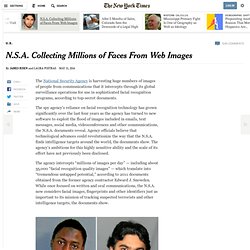
The spy agency’s reliance on facial recognition technology has grown significantly over the last four years as the agency has turned to new software to exploit the flood of images included in emails, text messages, social media, videoconferences and other communications, the N.S.A. documents reveal. Agency officials believe that technological advances could revolutionize the way that the N.S.A. finds intelligence targets around the world, the documents show. The agency’s ambitions for this highly sensitive ability and the scale of its effort have not previously been disclosed. Photo One N.S.A. It is not clear how many people around the world, and how many Americans, might have been caught up in the effort. Ms. Continue reading the main story. Q6035-E Network Camera, video clip.
Network cameras > AXIS Q6035 | AXIS Q6035-E > Video clips For the highest video quality and performance, AXIS Q6035/-E PTZ Dome Network Cameras are the choice.

The indoor and outdoor-ready PTZ domes provide high-definition surveillance of large areas and great details when zooming in. Notes to using the YouTube player below: To play in HDTV 1080p resolution, click the play button first. Then select the 1080p setting and click full screen using the menu items on the bottom right of the playback window. Why you should be worried about facial-recognition technology. It could be time for you to start worrying about what Facebook might be doing with the identity information collected on you and "tagged" photos.
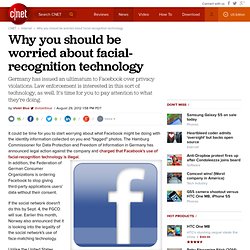
The Hamburg Commissioner for Data Protection and Freedom of Information in Germany has announced legal action against the company and charged that Facebook's use of facial-recognition technology is illegal. In addition, the Federation of German Consumer Organizations is ordering Facebook to stop giving third-party applications users' data without their consent. If the social network doesn't do this by Sept. 4, the FGCO will sue. Earlier this month, Norway also announced that it is looking into the legality of the social network's use of face-matching technology. Unlike the United States, Germany has regulations that allow Internet users control over their data. The new totalitarianism of surveillance technology. A software engineer in my Facebook community wrote recently about his outrage that when he visited Disneyland, and went on a ride, the theme park offered him the photo of himself and his girlfriend to buy – with his credit card information already linked to it.

He noted that he had never entered his name or information into anything at the theme park, or indicated that he wanted a photo, or alerted the humans at the ride to who he and his girlfriend were – so, he said, based on his professional experience, the system had to be using facial recognition technology. He had never signed an agreement allowing them to do so, and he declared that this use was illegal. He also claimed that Disney had recently shared data from facial-recognition technology with the United States military. Yes, I know: it sounds like a paranoid rant. Except that it turned out to be true. FBI techs shy away from facial recognition.
High performance access to file storage A senior FBI technologist declared last month that after decades of evaluation, the agency sees no point in facial recognition.
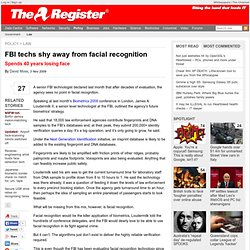
Speaking at last month's Biometrics 2009 conference in London, James A Loudermilk II, a senior level technologist at the FBI, outlined the agency's future biometrics' strategy. He said that 18,000 law enforcement agencies contribute fingerprints and DNA samples to the FBI’s databases and, at their peak, they submit 200,000+ identity verification queries a day. It’s a big operation, and it’s only going to grow, he said. Under the Next Generation Identification initiative, an irisprint database is likely to be added to the existing fingerprint and DNA databases.
BlackHat USA 2011: Faces Of Facebook-Or, How The Largest Real ID Database In The World Came To Be. Facebook quietly rolls out facial-recognition tool. "Weinergate" reminds us yet again that photos can quickly become embarrassing, and even scandalous.
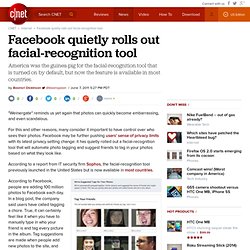
For this and other reasons, many consider it important to have control over who sees their photos. Facebook may be further pushing users' sense of privacy limits with its latest privacy setting change: it has quietly rolled out a facial-recognition tool that will automate photo tagging and suggest friends to tag in your photos based on what they look like. According to a report from IT security firm Sophos, the facial-recognition tool previously launched in the United States but is now available in most countries. According to Facebook, people are adding 100 million photos to Facebook each day. In a blog post, the company said users have called tagging a chore.
"When we announced this feature last December, we explained that we would test it, listen to feedback, and iterate before rolling it out more broadly," a Facebook spokesperson told CNET in an e-mail today. The Relative Sizes of the World’s Largest Photo Libraries. Facebook in new privacy row over facial recognition feature. Facebook has come under fire for quietly expanding the availability of technology to automatically identify people in photos, renewing concerns about its privacy practices.
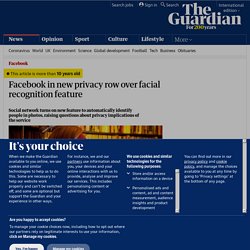
The feature, which the giant social network automatically enabled for its more than 500 million users, has been expanded from the US to "most countries", Facebook said on its official blog on Tuesday. Marc Rotenberg, president of the non-profit privacy advocacy group Electronic Privacy Information Center, said the system raised questions about which personally identifiable information, such as email addresses, would become associated with the photos in Facebook's database. App Gives You a Sort of Klout Score for Your Social Life. How social is your social life outside of social media?
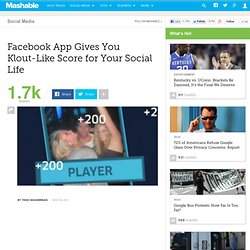
A new Facebook app from Ultimat Vodka attempts to answer that question by measuring the frequency of your checkins and using facial-recognition technology that analyzes photos on your Page to see how happy your friends are to hang out with you. The Social Life Audit app, released this week, rates your social status (measured by how many photos you appear in per week on Facebook). your crew size (the average number of people who appear in photos with you) and your activity level (how many places you check in to per week), among other factors, to make its determination. There are 12 variables in all, which are illustrated below. Some of the measurements are pretty dubious. With shoplifiting on the rise, retailers turn to social media for loss prevention.
Making Photo Tagging Easier. Facebook Facial Recognition: Its Quiet Rise and Dangerous Future. In early April, Engadget posted a short article confirming a rumor that Facebook would be using facial recognition to suggest the names of friends who appeared in newly uploaded photos.
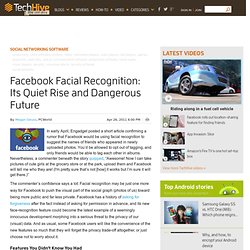
You’d be allowed to opt out of tagging, and only friends would be able to tag each other in albums. Facebook's Face-Recognition Tool Stirs Privacy Concerns. Facebook Faces Data-Privacy Penalty Over Facial-Recognition. Facebook Inc. may be fined by a German data-protection agency over a feature that uses facial- recognition software to suggest people to tag in photos on its social-networking site.
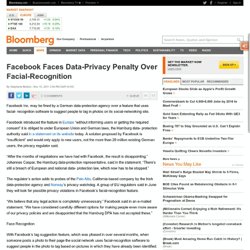
Facebook introduced the feature in Europe “without informing users or getting the required consent” it is obliged to under European Union and German laws, the Hamburg data- protection authority said in a statement on its website today. A solution proposed by Facebook is “insufficient” and would only apply to new users, not the more than 20 million existing German users, the privacy regulator said. “After the months of negotiations we have had with Facebook, the result is disappointing,” Johannes Caspar, the Hamburg data-protection representative, said in the statement. Why Facebook's Facial Recognition is Creepy. I'm not sure if you've heard the news, but Facebook is officially getting super-creepy. Facebook announced Tuesday that it will be implementing facial recognition technology for all users in the next few weeks, semi-automating the photo-tagging process. Sure, you can "opt-out" of the service, but it's a pretty weak consolation.
After all, opting out won't keep Facebook from gathering data and recognizing your face--it'll just keep people from tagging you automatically. The new facial recognition technology, which was announced in December but only introduced to a small test group, is basically Facebook's way of creating a huge, photo-searchable database of its users. And yes, it's terrifying. Souriez, vous avez été reconnu sur toutes les photos. SELON LE WALL STREET JOURNAL, les services de police de tous les États-Unis adopteront bientôt des systèmes portables de reconnaissance faciale qui leur permettront d’identifier les gens en les photographiant. Cette nouvelle fonction a été rendue possible par BI2 Technologies, une entreprise du Massachusetts qui a mis au point un petit appareil conçu pour s’adapter aux iPhones des policiers. Les services de police qui ont parlé au Wall Street Journal affirment n’envisager l'utilisation de ce dispositif que quand des agents soupçonneront des infractions et ne disposeront d’aucun autre moyen d’identification —quand par exemple ils arrêtent un conducteur qui n’a pas son permis sur lui.
Les policiers semblaient s’inquiéter aussi des conséquences pour les libertés civiques. Photographier quelqu’un à un mètre cinquante de distance peut-il être mis sur le même plan qu’une fouille? Pablo Valerio - Facial Recognition Tools Pose the Biggest Threat to Privacy. Face recognition is the biggest threat to privacy since the invention of photography. I love photography. I have been taking pictures since I was a teenager, and the arrival of digital cameras has been a blessing to photographers, letting them take thousands of pictures and then review, delete, and share them with family and friends.
But emailing shots to your family is one thing. Sharing them on social networking and picture sharing sites is another. Another data protection authority says Facebook's facial recognition feature violates European data protection law. On the 2nd of August 2011 the Hamburg Commissioner for Data Protection and Freedom of Information has called on Facebook to delete the feature on the social networking site that automatically recognizes facial features and "tags" users when others upload photos of them. According to the local German data protection authority the feature is a violation of local and European data protection laws, and Facebook should adapt the feature to European data protection law or suspend the use of the facial recognition technology.
The Commissioner calls the facial recognition technology a "serious interference with the informational self-determination of a person. With artificial intelligence, war goes 2.0. Artificial intelligence is becoming part of everyday life. As you type a search query in Google, an algorithm that learns what searchers are looking for helps you find your destination quicker. But the biggest shift AI may usher into the world is to change the face of warfare. "In the past, security work was really more arms and weapons," said Hsinchun Chen, director of the Artificial Intelligence Laboratory and McClelland professor of management information systems at the University of Arizona.
But, Mr. Chen said, over the past decade, the face of national security has changed, and now depends more and more on information. Cloud-Powered Facial Recognition Is Terrifying - Jared Keller - Technology. By harnessing the vast wealth of publicly available cloud-based data, researchers are taking facial recognition technology to unprecedented levels "I never forget a face," goes the Marx Brothers one-liner, "but in your case, I'll be glad to make an exception. " Unlike Groucho Marx, unfortunately, the cloud never forgets.
That's the logic behind a new application developed by Carnegie Mellon University's Heinz College that's designed to take a photograph of a total stranger and, using the facial recognition software PittPatt, track down their real identity in a matter of minutes. Head Pose Estimation (SD) Face Tracking Demonstration 1 (SD) Sécurité: les visages bientôt fichés? Les braqueurs de banques seront-ils bientôt aussi scientifiquement confondus par leur image captée par une caméra que par la goutte de sang ou l'empreinte laissées sur les lieux de leurs méfaits ? How Facial Recognition Works in Xbox Kinect. Microsoft’s $150 Xbox add-on, the Kinect, can use face-recognition technology to log you onto your Xbox Live account. GovBytes: Congress Concerned About Facial Recognition Technology. The dangers of facial recognition software in social media - UPIU.com. Hanwang Technology to Launch Face Recognition Lock. Trusted Faces ties up with Post Office to verify identity online.
Facebook Using Face Recognition Software On Every Photo You Upload! Face.com Brings Facial Recognition to the Masses, Now with Age Detection: Interview With CEO. Facial Recognition Technology Spurs Privacy Concerns for Feds. Facial recognition software is increasingly being used by both the public and law enforcement. But while the benefits, such as assisting police and federal agencies to keep criminals off the streets, are obvious, at least one member of Congress is concerned about privacy ramifications from the rapidly advancing technology. According to various news reports, Sen. Facial recognition: the case for and against 'total surveillance' Aussies the face of facial recognition. Tech 3.0: Face it - we're being watched. Met Police to harness facial recognition technology. FBI Launching Nationwide Facial Recognition Photo Search Service. A presentation slide demonstrates the schedule for implementation of the Next-Generation Identification system.
FBI to launch nationwide facial recognition service (Nextgov): The FBI by mid-January will activate a nationwide facial recognition service in select states that will allow local police to identify unknown subjects in photos, bureau officials told Nextgov.The federal government is embarking on a multiyear, $1 billion dollar overhaul of the FBI’s existing fingerprint database to more quickly and accurately identify suspects, partly through applying other biometric markers, such as iris scans and voice recordings.Often law enforcement authorities will “have a photo of a person and for whatever reason they just don’t know who it is [but they know] this is clearly the missing link to our case,” said Nick Megna, a unit chief at the FBI’s criminal justice information services division. Pittsburgh Pattern Recognition. How Google's New Face Recognition Tech Could Change The Web's Future.
Google Plus Installs Photo Face Recognition. Google Acquires Facial Recognition Software Company PittPatt.